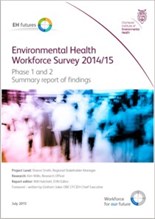One of the key findings to emerge from a survey undertaken by the CIEH, is that of the services previously provided by local authorities, the most commonly axed, due to budget cuts, over the past three years was pest control (71.9%).
| As for the future, the survey also identified that pest control was the most frequently cited service likely to be withdrawn over the next three years. Not good news for the majority of our local authority readers. Not a week after the Chancellor, George Osborne, launched his spending review with a call for £20bn cuts to Whitehall budgets, the Chartered Institute of Environmental Health (CIEH) voiced its concerns following the publication on 27 July of their Environmental Health Workforce Survey 2014/15. The CIEH expressed the view that any further reorganisation of services, coupled with continued reduction in resources, will have serious consequences for business, as well as to the long-term health and wellbeing of people in the UK. Already, following the continued cuts to public spending over the last few years, the resilience of vital environmental health services designed to protect businesses and the public are close to or already at a ‘tipping point’. |
||
| The report identifies that the average budget for environmental health services has fallen by 6.8% in real terms between 2013-14 and 2014-15. The local authorities that were able to estimate their budget for 2015-16 expected a further fall in real terms of 30% (this was prior to the Chancellor’s latest announcement), with vital services like pest control management and air quality monitoring frequently cited as the services most likely to be stopped over the next three years.
Further findings from the survey found that almost half of the respondents (47.4%) stated that resources were only just adequate to provide a basic statutory service, left no contingency and that any further cuts would compromise service delivery. Other key results from the CIEH’s survey include:
Graham Jukes OBE, chief executive of the CIEH, said that while environmental health practitioners at a local level have worked hard to reorganise services, increase partnership working and develop innovative projects, current resources have been stretched with no further room for manoeuvre. “Government policy is to focus on reducing the long-term costs to the NHS by encouraging preventative health actions and environmental health services are on the front-line of that agenda,” said Graham Jukes. “Local councils, however, have borne the brunt of the Government’s social and economic change programme over the past five years and this has meant essential environmental health services are at a tipping point. The Environmental Health Workforce Survey 2014/15 involved a detailed study over 18 months, looked at the impact of budget cuts on existing services delivered by environmental health managers in local councils and the effect that was having on their ability to continue to deliver services effectively. It is the first of a series of reports that addresses environmental health in local government. It also forms part of the wider EH Futures programme, which is setting out the CIEH’s vision to help support and plan for the environmental health profession over the next 10 years given the Governments current agenda. |
||


